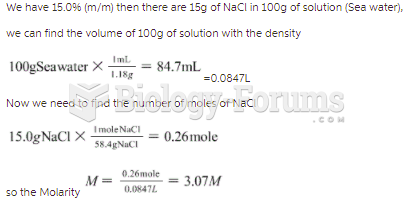This topic contains a solution. Click here to go to the answer
|
|
|
Did you know?
Inotropic therapy does not have a role in the treatment of most heart failure patients. These drugs can make patients feel and function better but usually do not lengthen the predicted length of their lives.
Did you know?
Aspirin may benefit 11 different cancers, including those of the colon, pancreas, lungs, prostate, breasts, and leukemia.
Did you know?
Medication errors are three times higher among children and infants than with adults.
Did you know?
There are more nerve cells in one human brain than there are stars in the Milky Way.
Did you know?
The first oral chemotherapy drug for colon cancer was approved by FDA in 2001.







